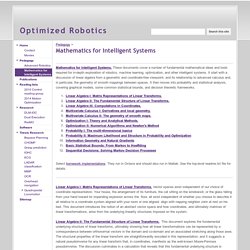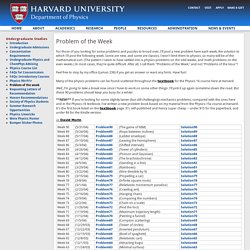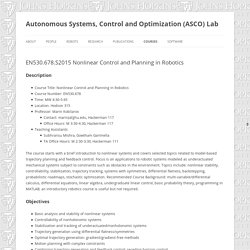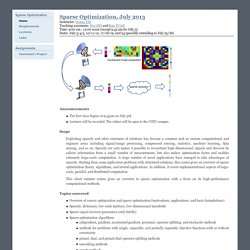

Hans.math.upenn.edu/~subhrabh/courses/toprob. Mathematics for Intelligent Systems - Optimized Robotics. Mathematics for Intelligent Systems.

These documents cover a number of fundamental mathematical ideas and tools required for in-depth exploration of robotics, machine learning, optimization, and other intelligent systems. It start with a discussion of linear algebra from a geometric and coordinate-free viewpoint, and its relationship to advanced calculus and, in particular, the geometry of smooth mappings between spaces.
It then moves into probability and statistical analysis, covering graphical models, some common statistical bounds, and decision theoretic frameworks. Linear Algebra I: Matrix Representations of Linear Transforms. Vector spaces exist independent of our choice of coordinate representation. Linear Algebra II: The Fundamental Structure of Linear Transforms. Adrl:education:lecture:fs2015 [LAB] Course Number: 151-0607-00L Lecture Hall: CAB G 11 Time: Tue, 14-16 (Lecture), 16-17 (Exercise) Lecturer: Jonas Buchli Head Assistant: Farbod Farshidian Office hours: Thu, 17:30-18:30, Room ML J 37.1.
![adrl:education:lecture:fs2015 [LAB]](http://cdn.pearltrees.com/s/pic/th/adrl-education-lecture-fs2015-127684750)
Hardcopy of script will be given in the lecture. Lecture slides will be available for download after the lecture. The following books are useful for additional reading: Sutton & Barto, Reinforcement Learning: An Introduction External Link These are very nice and quite elementary books, we recommend buying them. Additional reading material here. Harvard University Department of Physics. For those of you looking for some problems and puzzles to brood over, I'll post a new problem here each week, the solution to which I'll post the following week.

Some are new, and some are classics. I won't limit them to physics, so many will be of the mathematical sort. (The pattern I seem to have settled into is physics problems on the odd weeks, and math problems on the even weeks.) In most cases, they're quite difficult. After all, I call them "Problems of the Week," and not "Problems of the Hour"! Well, I'm going to take a break now since I have to work on some other things. **NEW! — David Morin © 2004 by David Morin. EN530.678.S2015 Nonlinear Control and Planning in Robotics. Description Course Title: Nonlinear Control and Planning in RoboticsCourse Number: EN530.678Time: MW 4:30-5:45Location: Hodson 315Professor: Marin KobilarovContact: marin(at)jhu.edu, Hackerman 117Office Hours: M 3:30-4:30, Hackerman 117Teaching AssistantsSubhransu Mishra, Gowtham GarimellaTA Office Hours: M 2:30-3:30, Hackerman 111 The course starts with a brief introduction to nonlinear systems and covers selected topics related to model-based trajectory planning and feedback control.

Focus is on applications to robotic systems modeled as underactuated mechanical systems subject to constraints such as obstacles in the environment. Topics include: nonlinear stability, controllability, stabilization, trajectory tracking, systems with symmetries, differential flatness, backstepping, probabilistic roadmaps, stochastic optimization. Objectives Reading There is no required textbook for the course. Schedule (tentative — check often!) Grading Policy. Department of Electrical Engineering. <a href=" Optimization, July 2013</a> Instructor: Wotao YIN Teaching assistants: Wei SHI and Kun YUAN Time: 9:00 am - 12:00 noon (except 9:45 am for July 3) Dates: July 3/4/5, 10/11/12, 17/18/19, and 24 (possibly extending to July 25/26) Announcements The first class begins at 9:45am on July 3rd.Lectures will be recorded.

The videos will be open to the USTC campus. Scope Exploiting sparsity and other structures of solutions has become a common task in various computational and engineer areas including signal/image processing, compressed sensing, statistics, machine learning, data mining, and so on. This short summer course gives an overview to sparse optimization with a focus on its high-performance computational methods. Topics convered Open questions, including difficult ones, will be assigned as homework and project assignments. Online discussion. Schonemann_Trace_Derivatives_Presentation.pdf.
Index of /~ksound/Math171S10. Andrew Lewis's WWW Homepage. ENEE 769B Advanced Topics in Control: Geometric Methods in Control and Information. Open Problems in Mathematical Systems and Control Theory. OptManifolds-Needle-Channel.pdf. APM 582 Geometry and Control of Dynamical Systems I, Fall 2010 : Course homepage. Arizona State University. Matthias Kawski. Hans.math.upenn.edu/~subhrabh/courses/toprob.